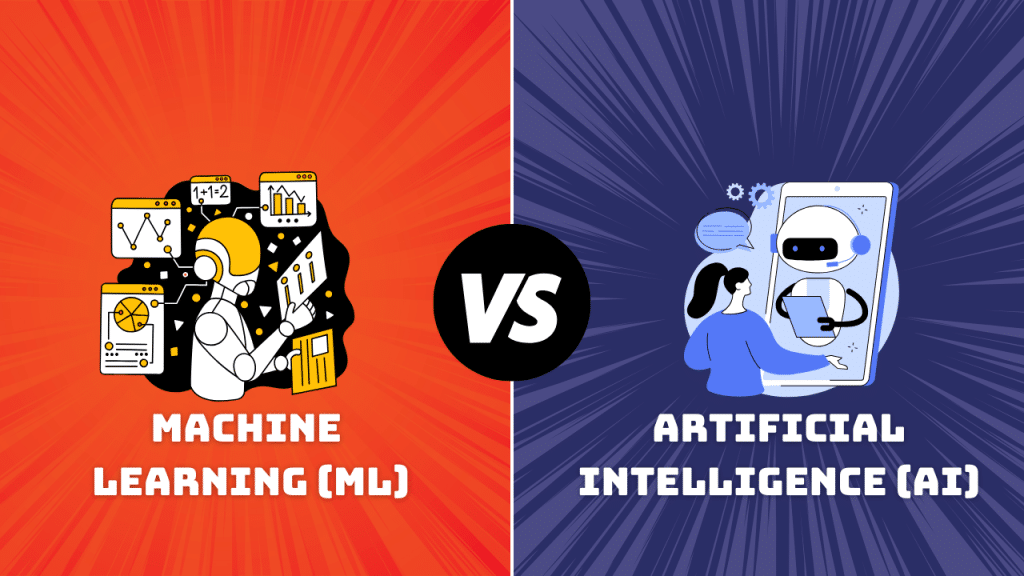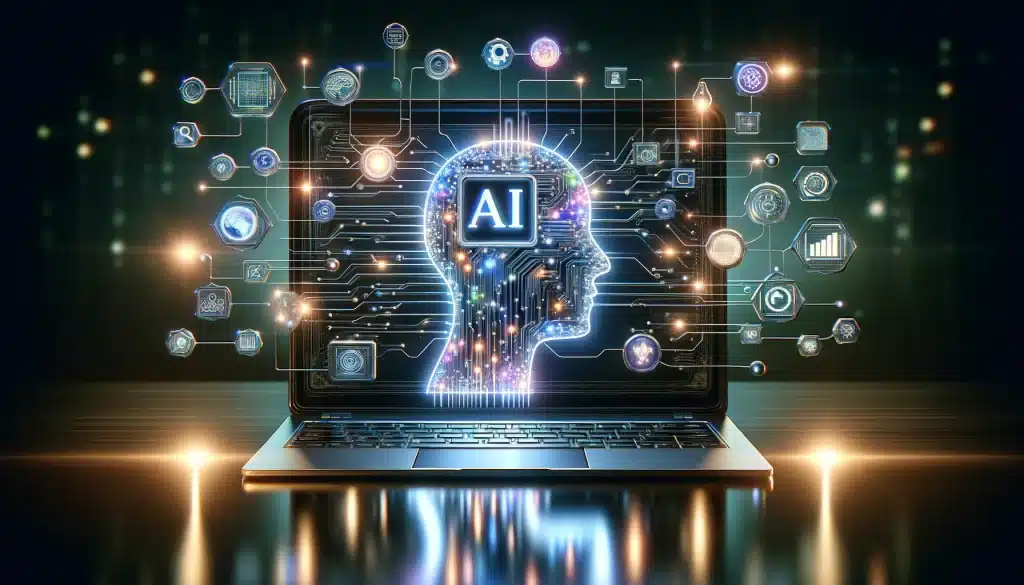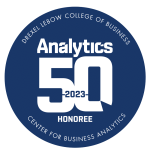Machine learning is becoming a game-changer in SEO and digital marketing.
With the help of machine learning, we’re able to understand our target audiences better than ever – and integrate the concepts of artificial intelligence and machine learning across all aspects of our strategies.
From task efficiencies and improvements, to personalized content, to spotting new trends, machine learning technologies has the ability to make our SEO and digital marketing strategies work smarter, faster and more effectively.
What is Machine Learning and Artificial Intelligence?
Machine learning and artificial intelligence are closely related and often used interchangeably. But it’s important to note they are different.
Machine learning is a subset of artificial intelligence; it’s a specific approach to artificial intelligence, while artificial intelligence is the broader category.
To compare it to the “rectangle-square” analogy (for those who may be familiar): machine learning is always artificial intelligence, but artificial intelligence is not always machine learning.
Let’s explore each.

Artificial Intelligence Defined
Artificial intelligence (or AI) is the broad field of technology that is designed to mimic human intelligence. This includes mimicry of human senses (visual and audio perception), and “human” behavior like decision-making, reasoning, logic, etc.
Key Examples
- Digital assistants (like Siri, Alexa, etc.)
- Chatbots
- GPTs (like OpenAI’s ChatGPT, Google’s Bard, etc.)
And for those who may be more film aficionados: Hal 9000 (voiced by Douglas Rain in 2001: A Space Odyssey), Deckard (played by Harrison Ford in Blade Runner).
Or more recent examples: Samantha (voiced by Scarlett Johnanson in Her), Marvel’s Vision and Ultron (played by Paul Bettany and James Spader, respectively) …
(But I digress.)
Machine Learning Defined
Machine learning is a subset of artificial intelligence that relies on input data in order to identify and build patterns and “learn” various programs or tasks.
Key Examples
- Search engines
- Natural language processing
- Content personalization (like Netflix’s Suggested for You functionality; Amazon’s Suggested Products)
- Email spam filters
- Facial recognition software
AI & Machine Learning Benefits
AI and machine learning have been a boon to multiple industries. It allows doctors to help detect diseases, it allows cars to drive themselves, it helps with weather predictions and natural disasters.
But it’s also a part of your daily life. Thanks to artificial intelligence and machine learning, you can unlock your phone simply by looking at it; you can get from Point A to Point B while driving (even when you’re detoured); you can ask Alexa or Siri to give you an almost instantaneous answer to any question imaginable.
But, if you’re reading this particular article – then you’re probably interested in the direct benefits artificial intelligence and machine learning have had on marketing and SEO.
Ability to Create more Targeted (and Effective) Strategies
Through machine learning and artificial intelligence, marketers have the ability to create hyper-targeted strategies to reach their target audience – providing much more effective results (when used correctly).
Think about it from a consumer perspective: how many times have you seen a product suggested to you based on your browsing history? How often have you seen a brand on your social platforms based on your related interests?
This type of reach – and these types of campaigns – are all highly dependent on machine learning concepts that identify patterns in your behaviors and your interests or, perhaps even more broadly, based on others’ behaviors and interests that are like you (think Facebook/Meta’s Lookalike audiences).
Machine learning identifies these patterns (in behaviors, in interests, etc.) to help us target our efforts into making sure we’re reaching the right audiences at the right time, maximizing both efficiency and impact.
Evolution of Tools
As artificial intelligence and machine learning technologies develop, so do the tools surrounding them. The integration of machine learning and artificial intelligence into existing tools gives us easier access to these technologies in an “easy to use” format.
One example: As an SEO, you’re probably familiar with Semrush, a tool that holds a database of millions of keyword data. By
integrating machine learning, we’re now able to quickly and efficiently categorize these keywords by different search intents like Informational, Navigational, Commercial, and Transactional.
Previously, this would have taken hundreds (to thousands) of hours for one website alone. And now? Seconds.
We’ve also seen new tools get developed that support our day-to-day SEO and digital marketing tasks. OpenAI’s ChatGPT can help in a countless number of ways, or perhaps you’re using an AI-powered video production tool to support your video content strategy.
With the development of machine learning and artificial intelligence for SEO, we now have access to exponentially more powerful and user-friendly tools that streamline and enhance SEO strategies like never before.
Create Efficiencies
Quick: how many times have you sent a text based on an auto-populated message? How many times have you used auto-complete to finish a Google search? An email? A text?
Chances are: quite a bit. Enter, machine learning and artificial intelligence.
Machine learning and artificial intelligence are creating “shortcuts” in our daily life – much like the ones shown in the examples above. But these “shortcuts” aren’t just applicable to our personal lives. Machine learning and artificial intelligence are also creating “shortcuts” (or in business speak, “efficiencies”) in our marketing work as well.
The examples above are likely applicable to your marketing responsibilities as well. You’ll send an email, and you’ll see an autosuggested finish to a sentence to that email you’re writing.
But it’s also more than that.
It helps us write content – from scratch (like content generated by GPT technologies).
It helps us create videos that otherwise would take higher technical skills and several hours of careful editing.
It helps us automate our tasks or meetings based on our calendar history.
It dynamically adjusts our calendars based on our workload, finding a way to balance the day (without feeling overwhelmed).
All of these are just a few different ways that artificial intelligence are creating efficiencies in the way we work – freeing up valuable time so that we can do our jobs more effectively and efficiently.
Challenges & Limitations
While there are obvious benefits, there are also challenges and limitations to machine learning (and artificial intelligence). Here are a few to consider:
- Data dependency. Data-driven is great – but we also need to remember the human side to marketing. We need to be able to understand what the data is telling us – but we also need to maintain the ability to understand the why behind the data.
- Lack of transparency. Machine learning and artificial intelligence make it very easy to identify patterns, group audiences, etc. But this might also lead to a “black magic” effect – where we don’t truly understand how we got to the findings and patterns identified by AI and machine learning.
- Over-reliance. As these technologies become more commonplace, it becomes exponentially easier to become reliant on these technologies in our day-to-day work. Machine learning and AI tools should be a tool for your marketing strategies – but they are not a replacement for creating effective marketing campaigns.
- High skill barrier to entry. The rapid advances in machine learning and AI are making the barrier to entry lower with every passing day – but that doesn’t always make it easy. There is still a technical understanding – especially for early adopters of technology advancements – that requires a high level of skill and experience.
How is Machine Learning & Artificial Intelligence Used in SEO (and Digital Marketing)?
So how, exactly, is machine learning and artificial intelligence used in the SEO world?
Short answer: it’s impacting a lot. Let’s dive in.
Tasks & Processes
The most obvious way machine learning is impacting SEO (and digital marketing) is the integration into various SEO tasks and processes.
It’s impacted every step of the process, from keyword research to content creation; from data analysis to find patterns to providing predictive analytics for key performance indicators (KPIs).
AI + Machine Learning Tools
Not every AI tool is a machine learning tool – but it’s important to know which tools are available in your digital marketing toolbelt. Here are some strong tools to consider for your AI + SEO (or digital marketing) toolkit.
Machine Learning Tools
- Stela Content Inventory. A FourFront-proprietary tool, Stela combines its web scraping, content inventory, and Natural Language Processing capabilities to find patterns in content across various your website (or websites).
- Semrush. Has various machine learning mechanisms like keyword intent/category.
- Marketbew. Uses machine learning to support keyword targeting for various pieces of content, predicting what keywords are most impactful for respective pieces of content.
AI Tools
- ChatGPT. A multipurpose AI tool that allows users to input (and ask for) help with various tasks.
- Jasper. An AI-powered content writing tool that helps with content creation to cure “blank page syndrome.”
- Dall-E. Creates high-quality images based on user prompts.
- Fliki.AI. Creates high-quality videos based on user prompts, complete with video, audio, and editing capabilities.
- Zapier. Used for task automation, Zapier can help create efficiencies in our daily assignments.
Provide a Competitive Advantage (and Get Ahead)
The concepts of machine learning and artificial intelligence certainly have “buzz” in the marketing industry – and for good reason.
By now, you should have a strong sense for how these tools can be helpful. And sure, these tools give you quite the arsenal to do your job better.
But what does that mean? It gives you – and your clients – a stark competitive advantage.
Integrating these tools and experience into your various tasks, practices and processes help you improve the way you do you work – providing your clients with a direct (and distinct) advantage against their competitors.
And let’s be honest – if you’re not adopting these practices, then you’re going to get left behind.
But don’t just take our word for it – here’s how we’re integrating into our SEO strategies and workflows processes at FourFront.
Examples of Machine Learning + AI Integration
At FourFront, we’ve been pioneering the adaptation of machine learning and artificial intelligence since our founding in 2010.
We were founded on the principle of machine learning: our first keyword monitoring tools were built to monitor keyword performance, track and monitor changes over time – and using machine learning, learn about the competitive landscape and user behaviors for target keywords over time. These learnings help support our SEO strategies at every step of the way.
We’ll provide a few examples on how this plays out at FourFront – and bring in a few members of the FourFront team to paint a more complete picture.
Keyword Research
Keyword research is a common task that has integrated machine learning and artificial intelligence. Whether it’s integrated into popular third-party tools like Semrush, or using algorithms to better understand search results, machine learning helps to identify and refine target keywords for our clients’ target audience(s).
From Jared Groff, Operations Manager at FourFront:
“Keyword research is the foundation of everything we do. Strong keyword research helps us understand what our target audiences are searching for and how often they’re searching for it.
But that’s only part of it. Machine learning and artificial intelligence helps us understand the true intent behind these keywords. Why are users searching for these keywords, and what do they want to get when they search for this? Google is focused on making sure its search results satisfy user intent – and its our job to understand what those intents are based on every keyword we’re targeting. AI and artificial intelligence help us better understand all of these things.”
Content Ideation (and Creation)
Explain how we’ve used various machine learning tools (like the Audience Interest report from the Tool) to help with content ideation, as well as GPT tools for content ideation (and generation).
From Leah MacDaniel, an SEO Specialist on our team:
“AI tools have been a big part of creating efficiencies in our content processes. From brainstorming topic ideas to creating first drafts of everything from social media posts to full webpage content, tools like ChatGPT and Perplexity have been a real boon.
I like to use AI to solve a very specific problem I call ‘Blank Page Syndrome’. I (and I expect many other content writers) have a much easier time working from a rough first draft than a blank page and a blinking cursor. What’s important to note here is that the human review and revision step is still essential. As good as these AI tools are at supporting and speeding up the content creation process, they’re no replacement for human experience and creativity.”
Predictive Analytics
For more than 10 years, we’ve been fine-tuning our systems for predictive analytics – based on a plethora of in-house and third-party data sources.
From our CEO, Bob Scavilla:
“FourFront started building machine learning models in 2014 to predict seasonal trends in philanthropy. We accomplished this by building a regression model to analyze correlations in the data we had accumulated over several years. The model was able to identify leading indicators that had strong correlation to outcome metrics. For several years, this model produced very accurate predictions for our client.
But that’s not all: we have also used machine learning to estimate market demand, price points, and the cost impact of competitors within proximity of a store location.”
The Future of Machine Learning and AI in SEO
At FourFront, we aim to stay “ahead of the curve” on the latest advancements in machine learning and artificial intelligence – and how they’re impacting the world of digital marketing and SEO.
From Bob Scavilla, on the impact of AI and machine learning on SEO:
“SEO is not just about improving website visibility; it’s about maximizing website productivity. In other words, SEO plays a crucial role in ensuring your website actively supports your business goals.”
On the future AI, machine learning, and business analytics:
“The future of business analytics lies with large language models (LLMs). Unlike earlier machine learning models that relied on a limited set of parameters for outcome predictions, LLMs leverage hundreds of billions of parameters and can self-direct their training. This enables advanced capabilities such as Zero-Shot learning, allowing the model to understand and solve problems without prior specific training or examples. In essence, LLMs can address entirely new challenges beyond their initial scope of training.
With the advent of custom LLMs, businesses will soon be able to integrate data from every aspect of their operations—including web metrics, marketing, sales, distribution, and financials—into their own private LLMs. These models will deliver instant decision support across critical areas such as budgeting, risk management, and operational optimization.
Additionally, they will simplify reporting on how effectively a website is performing as a front-end marketing tool, driving actionable insights for improvement.”
How to Integrate Machine Learning and AI into Your Strategies
So how do you integrate machine learning and artificial intelligence in your SEO and digital marketing strategies? Here are a few high level tips to get you started:
- Invest in the infrastructure.
- Be data-forward.
- Start training.
- Keep reading.
Additional Ethical & Privacy Considerations
It’s important to acknowledge that there are some ethical and privacy concerns to be aware of when discussing machine learning and artificial intelligence.
- Potential bias. There can be notable bias in algorithms, particularly in machine learning. If there is bias in training data, then there is bias in the output. It’s important to make sure you have a complete picture and representation from different groups to reduce bias in output.
- “Gaming the system” considerations. Machine learning makes it easier to identify patterns that may have been otherwise difficult (or near impossible) to discover. This could lead to adopters trying to “game the system” and find
- Too much personalization. Because machine learning relies so much on data, there are potential risks in data collection. The collection of highly-personalized data poses serious privacy risks for end users.
It’s essential to keep these considerations in mind to ensure fairness and transparency as you integrate these tools into your SEO and digital marketing strategies.
Partnering with a Technology-forward Digital Marketing Agency
The world of machine learning and artificial intelligence is exciting, but let’s be honest:
machine learning and artificial intelligence are complex technologies. It can be overwhelming: it’s a lot to learn, a lot to adapt to, and it can be intimidating for those who may not be familiar with new technologies and tools.
That’s why it’s important to partner with experts who truly understand these technologies, inside and out. At FourFront, we’ve been using machine learning techniques and technologies since 2010 – and we’re ready to help you.
Interested in machine learning for your SEO and digital marketing strategies? Reach out to our expert team today.











